#clean energy policy
Text
"Passed in February [2024], a massive subsidy program to help Indian households install rooftop solar panels in their homes and apartments aims to provide 30 gigawatt hours of solar power to the nation’s inventory.
The scheme, called PM-Surya Ghar, will provide free electricity to 10 million homes according to estimates, and the designing of a national portal—a sort of Healthcare.gov for solar panels—will streamline the process of installation and payment.
The program was cooked up because India had fallen woefully behind on its planned installations for rooftop solar. In many parts of the subcontinent, the sun is absolutely brutal and relentless, but by 2022, Indian rooftop solar power generation topped out at 11 gigawatts, which was 29 gigawatts under a national target set a decade ago.
Part of the challenge, Euronews reports, is that approval from various agencies and departments—as many as 21 different signatures in some cases—was needed to place a solar array on your house. Aside from this bureaucratic nightmare, the cost of installation was often higher than $5,000; more than half the average yearly income for a working Indian urbanite.
Under PM-Surya Ghar, subsidies for a 2-kilowatt solar array will cover as much as 60% of the installation costs, falling to 40% for arrays 3 kilowatts or higher. Loans set at around 7% interest rates will help families in need get started. 750 billion Indian rupees, or $9 billion has been set aside for the project.
Even in New Delhi, which can be covered in clouds and smog for days, solar users report saving hundreds during summer time on their electricity costs, with one apartment shaving $700 every month off energy bills.
PM-Surya Ghar is also seen as having the potential to cause a boom in the Indian solar market. Companies no longer have to go running around for planning and permitting requirements, and the government subsidies ensure their customer base can grow beyond the limits of household income."
-Good News Network, April 10, 2024
#india#new delhi#solar#solar panels#clean energy#solar power#renewables#rooftop solar#climate policy#climate action#climate hope#renewable energy#good news#hope
269 notes
·
View notes
Note
Re zoning regulation reform: could you go into detail as what that would look like in terms of wiping the slate clean. I feel like it would be better to go the houston route and just be zoning free
You do not want to go the Houston route.
youtube
Houston may claim to be "zoning-free" - and to be fair, it doesn't have some of the more common regulations on land use, or density, or height restrictions (more on this in a minute) - but the reality is far more complicated and the status quo is not one that's friendly to the interests of working-class and poor residents, or to the possibility of sustainable urbanism.
The answer to NIMBYism isn't to abolish all regulations and let the free market rip, it's to surgically target zoning, planning, and litigation that is used against affordable housing, public/social housing, mass transit, clean energy, and walkable neighborhoods, and to replace it with new forms of regulation that encourage these forms of development.
So let's take take these categories in order.
Zoning
As I tell my Urban Studies students, zoning is both one of the most subtle and yet comprehensive ways in which the state shapes the urban environment - but historically it has been used almost exclusively in the interests of racism and classism. Reforming zoning requires going over the code with a fine-toothed comb to single out all the many ways in which zoning is used to make affordable housing impossible:
The most important one to tackle first is density zoning and building heights limitations. The former directly limits how many buildings you can have per unit of land (usually per acre), while the latter limits how big the buildings can be (expressed either as the number of stories or the number of feet, or as both). Closely associated with these zoning regulations are minimum lot size regulations (which regulate how much land each individual parcel of real estate has to cover, and thus how many how many housing units can be built in a given area), and lot coverage, setbacks, and minimum yard requirements (which limit how much square footage of a lot can be built on, and what kinds of structures you can build).
the other big one is use zoning. To begin with, we need to phase out "single use" zoning that designates certain areas as exclusively residential or commercial or industrial (a major factor that drives car-centric development, makes walkable neighborhoods impossible, and discourages the "insula" style apartment building that has been the core of urbanism since Ancient Rome) in favor of "mixed use" zoning that allows for neighborhoods that combine residential and commercial uses. Equally importantly, we need to eliminate single-family zoning and adopt zoning rules that allow for a mix of different kinds of housing (ADUs, duplexes and triplexes, rowhouses/terraced houses, apartment buildings).
finally, the most insidious zoning requirements are seemingly incidental regulations. For example, mandatory parking minimums not only prioitize car-dependent versus transit-oriented development but also eat up huge amounts of space per lot. The most nakedly classist is "unrelated persons" zoning, which is used to prevent poorer people from subdividing houses into apartments, which zaps young people who are looking to be roommates and older people looking to finance their retirements by running boarding houses or taking in lodgers, as well as landlords looking to convert houses from owner-occupied to rental properties.
So I would argue that the goal of reform should be not to eliminate zoning, but rather to establish model zoning codes that have been stripped of the historical legacies of racism and classism.
Planning
Similar to how zoning shouldn't be abolished but reformed, the correct approach to planning isn't to abolish planning departments wholesale, but to streamline the planning process - because the problem is that right now the planning process is too slow, which raises the costs of all kinds of development (we're focusing on housing right now, but the same holds true for clean energy projects), and it allows NIMBY groups to abuse the public hearings and environmental review process to block projects that are good for the environment and working-class and poor people but bad for affluent homeowners.
As those Ezra Klein interviews indicate, this is beginning to change due to a combination of reforms at both the state and federal level to speed up the CEQA and EPA environmental review process in a number of ways. For example, one change that's being made is to require planning agencies and environmental agencies to report on the environmental impact of not doing a project as well, to shift the discussion away from petty complaints about noise and traffic and "neighborhood character" (i.e, coded racism and classism) and towards real discussions of social and environmental justice.
At the same time, more is needed - especially to reform the public hearing process. While originally intended by Jane Jacobs and other activists in the 1970s as a democratic reform that would give local communities a voice in the planning process, "participatory planning" has become a way for special interests to exercise an unaccountable veto power over development. Because younger, poorer and more working class, and communities of color often don't have time to attend public hearing sessions during the workday, these meetings become dominated by older, whiter, and richer residents who claim to speak for the whole of the community.
Moreover, because community boards are appointed rather than elected and public hearings operate on a first-come-first-serve basis, an unrepresentative minority can create a false impression of community opposition by "stacking the mike" and dialing up their level of militancy and aggression in the face of elected officials and civil servants who want to avoid controversy. (It's a classic case of diffuse versus concentrated interests, something that I spend a lot of classroom time making sure that my students learn.)
Again, the point shouldn't be to eliminate public hearings and other forms of participatory planning, but to reform them so that they're more representative (shifting public hearings to weekends and allowing people to comment via Zoom and other online forums, conducting surveys of community opinion, using a progressive stack and requiring equal time between pro and anti speakers, etc.) and to streamline the review process for model projects in categories like affordable housing, clean energy, mass transit, etc.
Litigation
Alongside the main planning process, there is also a need to reform the litigation process around development. In addition to traditional tort lawsuits from property owners claiming damage to their property from development, a lot of planning and environemntal legislation allows for private groups to sue over a host of issues - whether the agency followed the correct procedures, whether it took into account concerns about this impact or that impact, and so forth.
As we saw with the case of Berkeley NIMBYs who used CEQA to block student housing projects over environmental impacts around "noise," this process can be used to either block projects outright, or even if the NIMBYs eventually lose in court, to draw out the process until projects fall apart due to lack of funding or the proponents simply lose their patience and give up.
This is why we're starting to see significant reforms to both state and federal legislation to streamline the litigation process. The categorical exemptions from review that I discussed above also have implications for litigation - you can't sue over reviews that didn't happen - but there are also efforts to speed up the litigation process through reducing what counts as "administrative record" or by putting a nine-month cap on court proceedings.
Again, this is an area where you have to be very surgical in your changes. Especially when the politics of the issue divide environmental groups and create odd coalitions between labor, business, climate change activists, and anti-regulation conservatives, you have to be careful that the changes you are making benefit affordable housing, clean energy, mass transit and the like, not oil pipelines and suburban sprawl.
#public policy#housing#zoning#policy history#urban planning#public housing#social housing#yimbys#yimbyism#affordable housing#urban studies#urbanism#houston#nimbyism#nimbys#environment#climate change#clean energy
95 notes
·
View notes
Text
this election feels so hollow even though it’s likely ostensibly gonna be a good outcome. labour really just sucks fucking ass rn huh
#if the tories lose bad enough to make lib dems the opposition though… a guy can hope#I think it’s the fact that this is the first general election I can vote in that’s making me lose my mind a little here#I have done basically nothing but read today. I DO know a whole bunch more abt voting systems and the nightmare the tories have been now tho#I’m just kinda like. okay so what happens next? bc labour WILL do some decent shit but they also. fucking suck.#planning to look into the local green party once I’m back at uni bc I could actually do stuff there#I think I’m just dealing with a little bit of whiplash going from doing a biology degree where Everything is about climate change#like unambiguously it gets brought up in every topic (I DO focus on ecology and agricultural stuff and not like genetics but still)#clear consensus from literally everyone you talk to that shit has to happen right the fuck now.#it’s not even like I’m unaware of the state of policy rn I KNOW it’s a nightmare to do anything but we at least TALK about it#and then this election where it’s barely a footnote. biggest thing is the sewage dumping everyone’s talking about and yeah fucking finally#but is that all you’ve got?? the labour manifesto is bleak. it has a section and the stuff they’re proposing isn’t bad but it’s so little#and yeah no they’ve changed the official line on the manifesto to ‘make Britain a clean energy superpower’#I SWEAR it was different a few days ago#maybe I’m being pessimistic bc their plans for clean energy if they actually do them could be huge especially if they manage it by 2030.#it’s just that I know what the targets are and they’re already pulling back on shit like EVs bc of the shift right and I am So Tired#two party politics is a curse. as much as reform is an actual nightmare them getting a decent vote share might actually be the thing that#gets people talking abt proportional representation again bc they are nothing if not good at being loud#did you know we had a fucking referendum in 2011 bc what the fuck. and it went SO BADLY even though people generally supported it#god idk I think I’m once again being naively optimistic about people and election coverage has been very good at knocking me down a bit#people generally are good. I have to believe this. but man the british public is making that really fucking hard#genuinely I think a good chunk of that is down to first past the post driving politics to be divisive and aggressive#like is it the only problem? fuck no. but it’s definitely poisoning the way this shit goes bc when all the parties do is jab at each other#what are we actually doing here#idk I’m gonna stop now but this is taking up a ridiculous amount of bandwidth rn I can’t wait for it to be over#already dreading what the next election could look like in 4 years if starmer continues to suck ass bc I don’t trust him to not like at all#luke.txt#I said i was done but I just looked at the lib dem manifesto and oh my god it’s actually pretty good on this? holy fucking shit
4 notes
·
View notes
Text
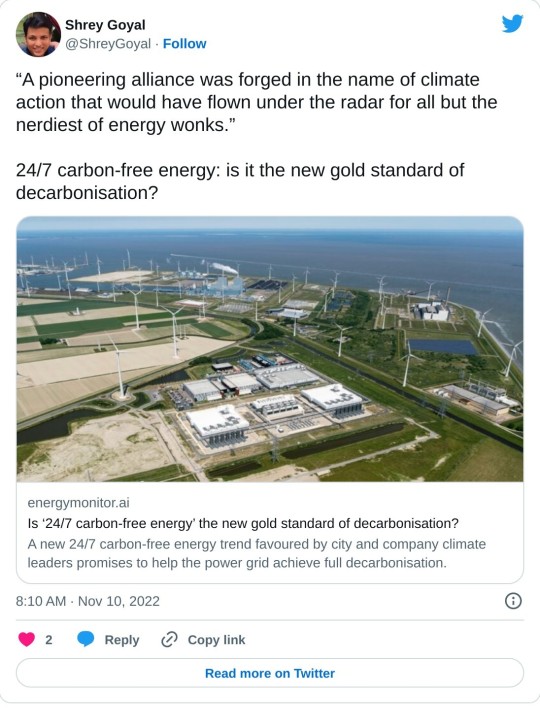
View on Twitter
“A pioneering alliance was forged in the name of climate action that would have flown under the radar for all but the nerdiest of energy wonks.”
24/7 carbon-free energy: is it the new gold standard of decarbonisation?
https://t.co/245T4B9uvK
(Source)
#Climate Change#clean energy#energy crisis#energy policy#Climate Crisis#Late Stage Capitalism#My Tweets
2 notes
·
View notes
Text
god, so many fucking things will be overturned/withdrawn/cut back under a gop administration...
#all the changes to SNAP and other aid#anything involving race or gender equity or lgbt protections under the law#medicaid and medicare policies covering more#any and all of the green/clean energy stuff#just...the list goes on and on#this is my scary story for halloween#we'd have orban meets truss with shades of modi
3 notes
·
View notes
Quote
China is leading the way on renewable energy and moving away from fossil fuel dependence, said Buckley, who tracks the country’s energy policy. “It might be because they are paranoid about climate change or because they want to absolutely dominate industries of the future. At the end of the day, the reason doesn’t really matter.” India is also investing heavily in renewable energy and has committed to producing 50% of its power from clean energy sources by 2030. “The invasion has made India rethink its energy security concerns,” said Swati D’Souza, of the Institute for Energy Economics and Financial Analysis.
‘What the war in Ukraine means for Asia’s climate goals’, Associated Press
#Associated Press#China#renewable energy#fossil fuel dependence#Tim Buckley#energy policy#climate change#India#clean energy sources#2022 Russian invasion of Ukraine#Swati D’Souza#Institute for Energy Economics and Financial Analysis#energy security
2 notes
·
View notes
Text
youtube
‘You set policy, the markets react’ — Here’s how Gov. Gavin Newsom sees California as a leader in clean energy in the U.S.
This video was made with support from Climate Power
#Earth #Environment #ClimateCrisis #NowThis
#now this earth#now this#solarpunk#USA#Gavin Newsom#california#clean energy#green energy#renewable energy#Climate Power#Clean Energy Policies#Youtube
3 notes
·
View notes
Text
USAmericans
Read the Project 2025 manifesto RIGHT NOW
It's MUCH worse than y'all have been hearing
There is so much here you'll have to look at it for yourself, but the climate policy alone is nightmare fuel.
The republican coalition wants to essentially end funding for green energy, dramatically promote and expand fossil fuel industries, and eliminate funding and regulations in all sectors promoting climate change mitigation. Task forces and offices related to clean energy and lowering carbon emissions will be eliminated and replaced with offices for promoting fossil fuels.
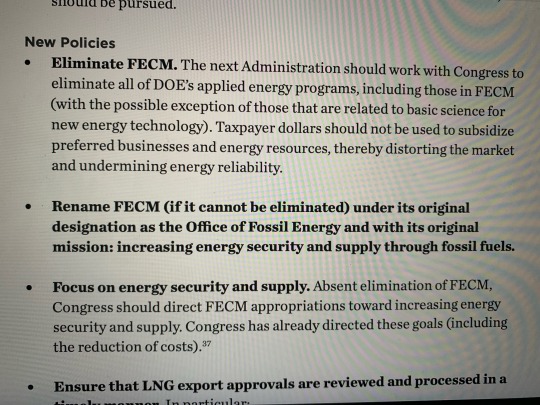
They want to LOG NATIONAL FORESTS TO "THIN" THE TREES TO STOP WILDFIRES.
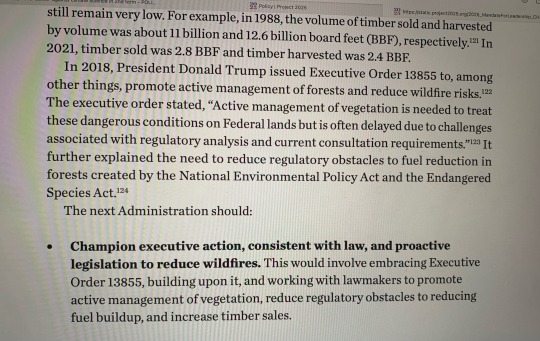
THEY WANT TO FORCE OREGON AND CALIFORNIA TO LOG THEIR NATIONAL FORESTS AND TREAT THEM AS FOR TIMBER PRODUCTION
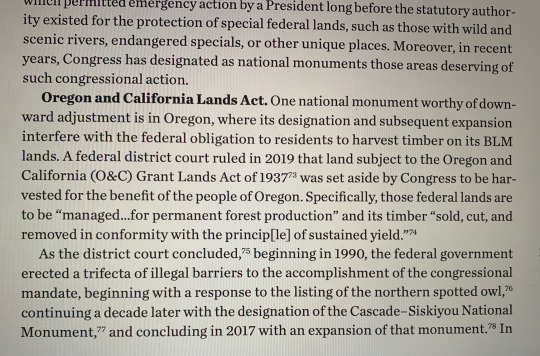
There are specific provisions in Project 2025 to essentially destroy the Endangered Species Act, causing it to defer to the rights of "economic development" and "private property." The plan includes delisting gray wolves, cutting the budget so that a "triage" system is used to determine which species will get protection, removing funding for research, removing experts and specialists from the decision-making process, and preventing "experimental" populations of animals from being established.
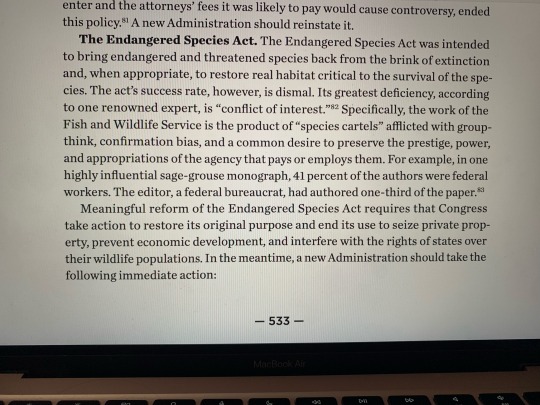
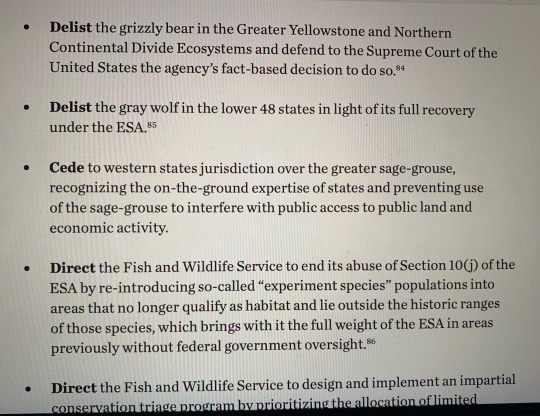
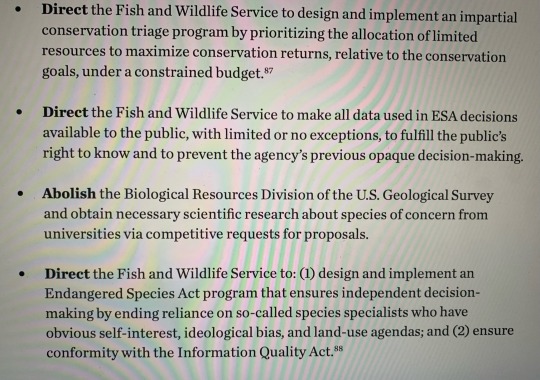
This is so much worse than I expected it to be and there's much more past that: They want to deregulate pesticides and remove much of the EPA's ability to regulate pollutants as well.
Also included in the manifesto is that we should
withdraw from nuclear weapons nonproliferation agreements, build more nuclear weapons, and resume nuclear weapons testing

The manifesto comprehensively outlines the scorched-earth elimination of abortion access, down to ensuring doctors aren't even trained to perform abortions. There are plans in here to disrupt abortion access GLOBALLY, not just domestically.
Not only that,the Republicans plan on reframing family planning programs around "fertility awareness" and "holistic family planning."
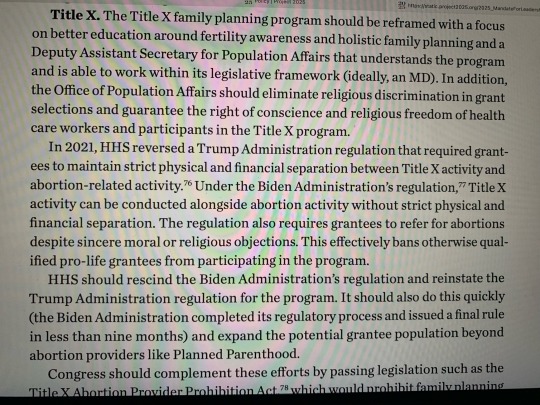
I can't even describe it all. I'm trying to give screenshots of the most important things but there's so much.
The foreign policy is a nightmare. They plan to push fossil fuels onto the Global South and promote the development of fossil fuel industry in the "developing world."
It is aggressive and antagonistic towards other nations, strongly pro-military, proposing that we INCREASE (!!!!!) defense spending, improve public opinion of the military and military recruitment, and increase the power to fund new weapons technology.
Just read the Department of Defense section. It's about greatly increasing and strengthening the military-industrial complex, collaborating more closely with weapons manufacturers, removing regulatory barriers to arming our allies and to inventing new military weapons, and recruiting more people into the military. They include provisions to develop AI technology for surveillance. And of course, continuing to support Israel is in there.
Elsewhere it proposes interfering in foreign countries with creepy pro-USA propaganda campaigns, even establishing international educational programs where faculty have to pledge to promote USA interests.
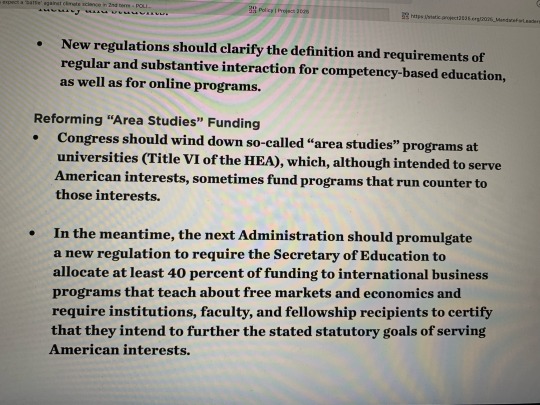
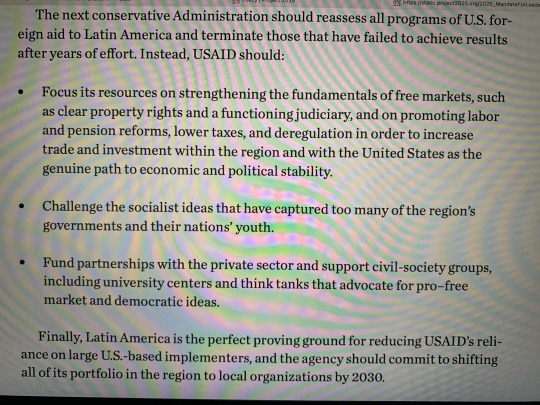
There's a line in here about getting rid of PBS because SESAME STREET is LEFTIST for God's sake.
HOW are people claiming democrats have the same policies. I feel like i'm losing my mind.
16K notes
·
View notes
Text
"It’s alarming that only a few weeks into the summer we’ve already experienced a prolonged heat wave that has put about 36 million Americans under excessive heat warnings and shattered temperature records across the West."
"But even as Americans die from preventable heat-related illness, officials aren’t using all the tools available to them to respond."
"There are few areas where modernization of disaster response is more pressing than with heat waves. The old ways just aren’t cutting it anymore. Americans deserve a robust approach that’s befitting of our new #climatereality."
LA Times editorial
#Climate Change#Climate Crisis#Climate Goals#Protect The Planet#There Is No Planet B#Climate Change Reporting#Climate Journalism#Covering Climate Crisis#Our Home In Space#Fossil Fuel Caused Climate Change#Clean Energy Now#Los Angeles Times#climate change editorial#Government Heat Policy#climate reality
0 notes
Text
Blog Post
Checkout my blog about advocating on the hill! https://nsryan.github.io/blogs/2024-07-03_advocacy_on_hill.html
#clean energy#environmental policy#nuclear#nuclear energy#science communication#student#advocacy#advice
0 notes
Text
youtube
#youtube#militarytraining#President Biden#Climate Change#Biden Administration#Sustainability#Environmental Protection#Climate Policy#Global Warming#United States#Renewable Energy#Climate Crisis#Climate Deniers#Green Energy#Paris Agreement#Speech#Carbon Emissions#Clean Energy#Environment#Renewable Resources#Climate Action#Political Speech#Climate Resilience#Environmental Policy#Natural Disasters#Green New Deal#Extreme Weather#Weather Patterns#Weather Alert
0 notes
Text
What is the Average EV Range in 2024?
Electric vehicles (EVs) have seen remarkable advancements over the past few years, making them more viable for everyday use. As of 2024, the average EV range has become a critical factor for consumers considering the shift from traditional combustion engines to electric power.
In 2024, the average EV range is approximately 300 miles (483 kilometers) on a single charge. This is a significant…

View On WordPress
#2024 EVs#Aerodynamics#automotive industry#battery life#battery technology#charging infrastructure#charging stations#Clean Energy#consumer demand#Eco-Friendly#electric mobility#electric power#electric vehicles#emissions#energy density#energy management#energy storage#Environmental Impact#EV adoption#EV efficiency#EV Market#EV range#EV trends#fast-charging#Ford Mustang Mach-E#future of mobility#government policies#green technology#innovation#lightweight materials
1 note
·
View note
Text
Pass legislation to significantly expand transmission for clean energy NOW!
AN OPEN LETTER to THE PRESIDENT & U.S. CONGRESS
820 so far! Help us get to 1,000 signers!
Right now, there are at least 2,000 gigawatts of renewable energy waiting for permission to connect to power lines in the U.S., which is more than the total capacity of the country’s existing power plants. Wait times to connect new power plants to the grid can reach five years or more. Without rapidly improving transmission, the United States will not be able to achieve Biden's goal of 100% clean energy by 2035 or provide cheaper, more reliable electricity to American households. If the U.S. can’t build new transmission at a faster pace, roughly 80 percent of the emissions reductions expected from the Inflation Reduction Act–the largest climate legislation in U.S. history–might not happen.
That’s why I’m writing to urge Congress to pass legislation to significantly expand transmission for clean energy.
Multiple efforts are currently in play. Most recently in the House, Representatives Sean Casten and Mike Levin introduced the Clean Energy and Transmission Acceleration Act, (HR 6747) which would encourage the development of new transmission lines to carry renewable power where it’s needed while protecting the rights of communities to provide input on where lines are built and to benefit from their construction. I strongly support this bill.
But any legislation is better than none, and NONE of the bills proposed so far have been passed. This is not good.
Increasing access to clean energy will help tackle the climate crisis by ensuring the reliability of the grid and reducing consumers' bills. Renewable energies like wind and solar are quickly becoming the least expensive source of energy and we need to make sure as many people as possible get access to these clean, abundant energy sources.
Please pass a strong, fair transmission bill—like HR 6747—that prioritizes clean energy, climate change, and environmental justice. This is urgent; all of our children are counting on us to secure their futures. Thanks.
▶ Created on April 23 by Jess Craven · 819 signers in the past 7 days
📱 Text SIGN PMNVSR to 50409
🤯 Liked it? Text FOLLOW JESSCRAVEN101 to 50409
#JESSCRAVEN101#PMNVSR#resistbot#Clean Energy#Renewable Energy#Climate Action#Transmission Expansion#Green Energy#Clean Energy Now#Climate Change#Energy Infrastructure#Renewables#Climate Crisis#Energy Policy#Infrastructure Bill#Green Grid#Renewable Power#Energy Transition#Climate Legislation#Sustainable Energy#Clean Tech#Electric Grid#Energy Security#Energy Equity#Renewable Future#Grid Modernization#Climate Justice#Energy Innovation#Renewable Resources#Energy Efficiency
0 notes
Text
MIT researchers map the energy transition’s effects on jobs
New Post has been published on https://thedigitalinsider.com/mit-researchers-map-the-energy-transitions-effects-on-jobs/
MIT researchers map the energy transition’s effects on jobs
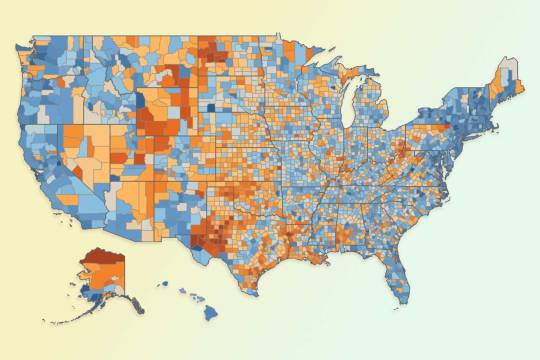

A new analysis by MIT researchers shows the places in the U.S. where jobs are most linked to fossil fuels. The research could help policymakers better identify and support areas affected over time by a switch to renewable energy.
While many of the places most potentially affected have intensive drilling and mining operations, the study also measures how areas reliant on other industries, such as heavy manufacturing, could experience changes. The research examines the entire U.S. on a county-by-county level.
“Our result is that you see a higher carbon footprint for jobs in places that drill for oil, mine for coal, and drill for natural gas, which is evident in our maps,” says Christopher Knittel, an economist at the MIT Sloan School of Management and co-author of a new paper detailing the findings. “But you also see high carbon footprints in areas where we do a lot of manufacturing, which is more likely to be missed by policymakers when examining how the transition to a zero-carbon economy will affect jobs.”
So, while certain U.S. areas known for fossil-fuel production would certainly be affected — including west Texas, the Powder River Basin of Montana and Wyoming, parts of Appalachia, and more — a variety of industrial areas in the Great Plains and Midwest could see employment evolve as well.
The paper, “Assessing the distribution of employment vulnerability to the energy transition using employment carbon footprints,” is published this week in Proceedings of the National Academy of Sciences. The authors are Kailin Graham, a master’s student in MIT’s Technology and Policy Program and graduate research assistant at MIT’s Center for Energy and Environmental Policy Research; and Knittel, who is the George P. Shultz Professor at MIT Sloan.
“Our results are unique in that we cover close to the entire U.S. economy and consider the impacts on places that produce fossil fuels but also on places that consume a lot of coal, oil, or natural gas for energy,” says Graham. “This approach gives us a much more complete picture of where communities might be affected and how support should be targeted.”
Adjusting the targets
The current study stems from prior research Knittel has conducted, measuring carbon footprints at the household level across the U.S. The new project takes a conceptually related approach, but for jobs in a given county. To conduct the study, the researchers used several data sources measuring energy consumption by businesses, as well as detailed employment data from the U.S. Census Bureau.
The study takes advantage of changes in energy supply and demand over time to estimate how strongly a full range of jobs, not just those in energy production, are linked to use of fossil fuels. The sectors accounted for in the study comprise 86 percent of U.S. employment, and 94 percent of U.S. emissions apart from the transportation sector.
The Inflation Reduction Act, passed by Congress and signed into law by President Joe Biden in August 2022, is the first federal legislation seeking to provide an economic buffer for places affected by the transition away from fossil fuels. The act provides expanded tax credits for economic projects located in “energy community” areas — defined largely as places with high fossil-fuel industry employment or tax revenue and with high unemployment. Areas with recently closed or downsized coal mines or power plants also qualify.
Graham and Knittel measured the “employment carbon footprint” (ECF) of each county in the U.S., producing new results. Out of more than 3,000 counties in the U.S., the researchers found that 124 are at the 90th percentile or above in ECF terms, while not qualifying for Inflation Reduction Act assistance. Another 79 counties are eligible for Inflation Reduction Act assistance, while being in the bottom 20 percent nationally in ECF terms.
Those may not seem like colossal differences, but the findings identify real communities potentially being left out of federal policy, and highlight the need for new targeting of such programs. The research by Graham and Knittel offers a precise way to assess the industrial composition of U.S. counties, potentially helping to target economic assistance programs.
“The impact on jobs of the energy transition is not just going to be where oil and natural gas are drilled, it’s going to be all the way up and down the value chain of things we make in the U.S.,” Knittel says. “That’s a more extensive, but still focused, problem.”
Graham adds: “It’s important that policymakers understand these economy-wide employment impacts. Our aim in providing these data is to help policymakers incorporate these considerations into future policies like the Inflation Reduction Act.”
Adapting policy
Graham and Knittel are still evaluating what the best policy measures might be to help places in the U.S. adapt to a move away from fossil fuels.
“What we haven’t necessarily closed the loop on is the right way to build a policy that takes account of these factors,” Knittel says. “The Inflation Reduction Act is the first policy to think about a [fair] energy transition because it has these subsidies for energy-dependent counties.” But given enough political backing, there may be room for additional policy measures in this area.
One thing clearly showing through in the study’s data is that many U.S. counties are in a variety of situations, so there may be no one-size-fits-all approach to encouraging economic growth while making a switch to clean energy. What suits west Texas or Wyoming best may not work for more manufacturing-based local economies. And even among primary energy-production areas, there may be distinctions, among those drilling for oil or natural gas and those producing coal, based on the particular economics of those fuels. The study includes in-depth data about each county, characterizing its industrial portfolio, which may help tailor approaches to a range of economic situations.
“The next step is using this data more specifically to design policies to protect these communities,” Knittel says.
#000#2022#Analysis#approach#biden#carbon#carbon footprint#Center for Energy and Environmental Policy Research#clean energy#climate change#coal#Community#Composition#data#Design#economic#Economics#economy#effects#Emissions#employment#energy#energy consumption#energy production#Environmental#fossil#Fossil fuels#fuel#fuels#Full
0 notes